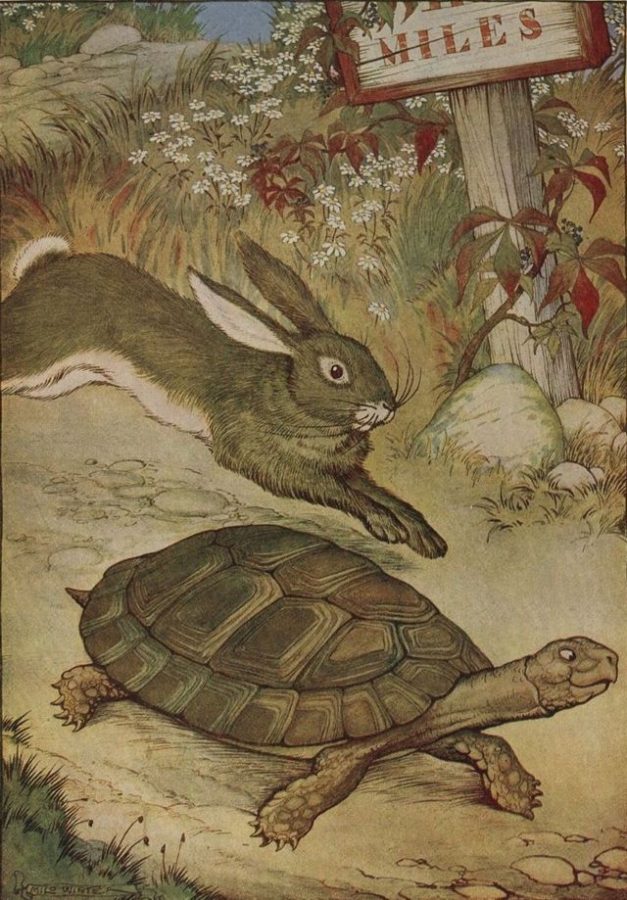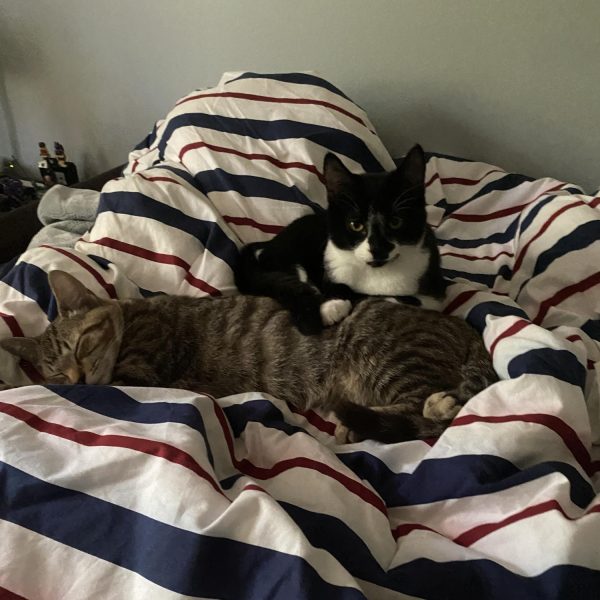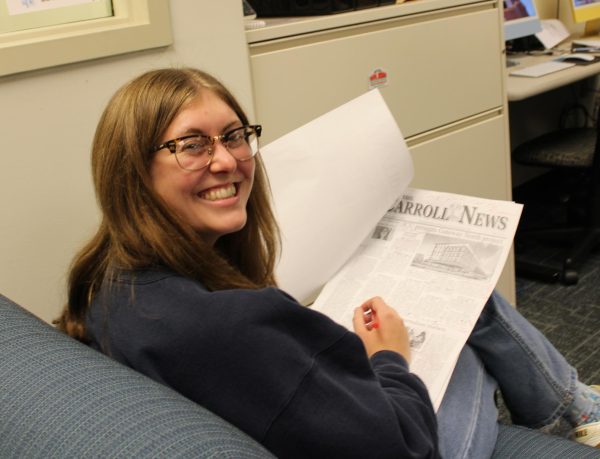Giba’s Claim: Are you a tortoise or a hare?
A reflection on education and how we learn and retain understanding.
Milo Winter, Public domain, Wikimedia Commons
From The Aesop for Children by Aesop.
The headline is a question you probably have an intuitive answer to. Let me preface by saying what I’m talking about is in an intellectual sense — how you think, how you process, how you get through a task of the mind.
Personally, I’m more of a tortoise.
For reading, I tend to pace more slowly, to take time to immerse myself in the details. I don’t particularly enjoy reading fast — I feel like I gloss over details and miss parts that contribute to comprehending a whole idea. Even typing this now, I try to go slower and consider each word.
I love having the time to mull over something, to pick it apart and peak all its angles and ends, to be careful with it, raise it up in my mind and have a dialogue with it, whether it be an idea or a narrative, or the occasionally obstinate task of 100%-ing a video game.
On the other edge of my internal debate, I have a preoccupation with running out of time. Books pile on my shelves by the year. I get through some, have cracked open most, learning each page’s contents at my own pace. I save articles, YouTube videos, newsletters.
There’s a sliver inside me that sometimes glances into the ocean of pages and saved bits and freaks out a little.
“What if I’m not fast enough? What if I’m too idle? Shouldn’t I be wringing essence out of these interests all the time?”
But those thoughts flee. At my marrow, I’m concerned about the stories and theories and worthwhile ideas I may not be able to dine with, the ones that could gather in the isolation of neglect rather than the love of margin scribbles, open dialogue, bent spines and notes taken.
I try to hear that existential clock ticking. The experience can rattle me forward. Sometimes it’s what I need to help realize what’s important.
Malcolm Gladwell’s podcast Revisionist History has an episode that discusses tortoises and hares in higher education — specifically in their relation to law and the Law School Admissions Test (LSAT). This talk sparked this column.
The test, Malcolm purports, rewards hares — those with the “90% correct in half the time used is better than 100% with double the time” mindset, as put so succinctly by one of my roommates. The best hares — they’re quick and efficient and can sprint through a test locked in on the 35-minute sections of the LSAT.
Those that score high on the test are admitted to the best law schools, generally speaking. Then, those students go on to clerk for influential judges, also generally speaking. This is a cycle of hares and Ivy schools running the upper echelon.
There are exceptions, however. Former Associate Justice of the Supreme Court Antonin Scalia is cited in the podcast having talked about Judge Jeffrey S. Sutton.
Sutton clerked for Scalia after having been hired by Associate Justice Lewis F. Powell, Jr. (who assumed senior status); in this clip, Scalia implies he never would have hired Sutton based on the fact that he went to Ohio State Law School and not Harvard Law School.
This sort of mindset can be taken as discrimination based on education. Using the college here is the baseline for consideration, which seems foolish to me, considering there is much more to someone than their GPA and LSAT score (Yes, we have to measure people in a standard manner somehow. Gladwell’s point is that the test is skewed toward hares.)
Interestingly, Scalia says that Sutton was the best clerk he ever had. And evidently enough — Sutton is one of the most renowned judges alive right now, serving as the current Chief Circuit Judge of the Court of Appeals for the Sixth Circuit and formerly as Ohio Solicitor General.
He didn’t even try to apply to Yale or Harvard, as Gladwell infers he didn’t have the scores — he applied to Michigan and Ohio State and got into Ohio State Moritz College of Law. Now he’s on track for a potential Supreme Court appointment himself down the line.

In Gladwell’s podcast, Sutton himself says he’s a tortoise. Other interviewees in law say that law requires a tortoise’s mindset. Think of all the pages some of these folks have to read! My bookshelves are quivering just at the thought.
Why does the LSAT favor the hares when the skills of a tortoise are needed just the same? What else in higher education is designed around this desire for speed and efficiency?
Well, look around. It’s the culture, practically. Sometimes I’m not even sure if we’re truly learning — if what we’re doing is just going from one assignment to the next just to promptly forget it the next semester. We try to retain as much as we can, but sometimes the information slips out of us in between semesters. It’s fair to ask, did we prioritize learning it, knowing it, understanding it — or do we just do it for the assignment?
Our educational system rewards hares though — the go-go-go mentality of the hustle — the “continual grind,” plus whatever other phrases they have up on Saxby’s menu.
Listen, I’m all for hard work. But we aren’t encouraged to slow down anymore. What’s the fine line between browsing and understanding? If you slow down, it becomes quite obvious with a few rereads or a training of the attention what we’re missing when we go too fast. This is especially apparent in compact philosophical texts, for example.
What implications does this notion have on how we interact with other things we consume, such as our media? Our multitasking between screens with an active loss of analog and tactile memory advantages results in our alienation from the material in front of us.
The doom scroll of daily curated content from TikTok or a non-chronological timeline from Instagram often leaves me having little to no idea what I looked at the day beforehand. I’d call this browsing. It’s not understanding or learning. Maybe we save the thing we saw or send it to a friend. Then it gets sucked into the timeline with everything else. This has become a global and national pastime, so to speak. Maybe that’s why baseball’s in decline.
Without taking the consideration of the tortoise, we run the risk of tossing half if not more of what we’re consuming away.
We can’t remember everything we ever consume — this is simply unrealistic. But what we can try to do is slow down with the ideas, avoid numbing ourselves with browsing and work on replacing it for understanding.
Our English department’s very own Dr. Brian Macaskill is a proponent of this perspective, aligning himself with the wise words of how Friedrich Nietzsche viewed himself: “that is to say, a teacher of slow reading.”
In the same vein, there is much to be learned from the hare, where some situations require rapid decisions to be made in a short time, or where iterations must be made on a project as frenetically as possible to move forward on time. These are ideas I work to incorporate into my mind too, despite my tendency toward slowing things down. We live in a dualistic world, where we need people with both skills. Finding your own strength is important—but address the weaknesses.
Try it out by shifting your perspective. What may you be consuming too fast or too much of? Do you need time to graze upon a thought, to sift through the minutiae? What could the tortoise teach the hare? What could the hare teach the tortoise?
Jack Giba is a Senior from Pittsburgh, Pennsylvania. You can reach him at jgiba22@jcu.edu.








